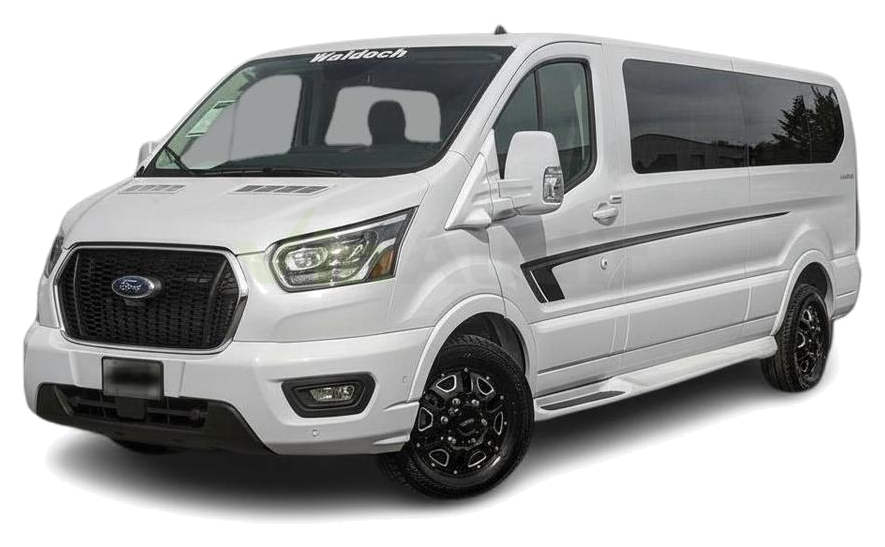The Good
The 2023 Ford Transit offers a compelling blend of advantages. Its robust engine options deliver strong performance and towing capacity for practical work needs, while its spacious, customizable interior provides comfort for long hauls. The modern, utilitarian design appeals to businesses, and its reputation for durability translates to a reliable workhorse. For emotional buyers, the sheer versatility fosters a sense of capability and freedom for conversions and specialized uses.
The Bad
Potential weaknesses for the 2023 Ford Transit include its relatively thirsty fuel economy, especially with the EcoBoost engine and heavy loads, which can be a practical concern. Some owners might find the interior materials rugged rather than refined. Visibility can also be challenging in certain configurations, requiring reliance on driver-assistance systems.
2023 Ford Transit: Quick Overview
- Engine Options:
- Standard 3.5-liter PFDI (Port Fuel Direct Injection) V6 engine.
- Optional 3.5-liter EcoBoost V6 engine (twin-turbocharged).
- Horsepower:
- 3.5L PFDI V6: Approximately 275 hp and 262 lb-ft of torque.
- 3.5L EcoBoost V6: Approximately 310 hp and 400 lb-ft of torque.
- Fuel Economy:
- Official EPA ratings are often not provided for commercial vans due to their varied configurations and gross vehicle weight ratings (GVWR). However, real-world estimates generally fall in the 14-17 MPG combined range for the gasoline engines, depending heavily on load, driving style, and configuration. The EcoBoost tends to be more powerful but can be less efficient if driven aggressively.
- 0-60 Times:
- The Ford Transit is not designed for acceleration. 0-60 mph times vary significantly with load and configuration, typically ranging from 7.5 to 9.5 seconds for the EcoBoost models and slightly longer for the naturally aspirated V6. These figures are rarely a primary consideration for buyers in this segment.
- Towing Capacity:
- Towing capacity is highly dependent on configuration (engine, wheelbase, axle ratio, body style, RWD vs. AWD). Max towing can range from around 4,500 lbs to an impressive 7,500 lbs when properly equipped with the EcoBoost engine and heavy-duty trailer tow package.
- Trim-Level Features & Configurations:
- Body Styles: Cargo Van, Passenger Van (XL, XLT), Cutaway, Chassis Cab.
- Roof Heights: Low, Medium, High.
- Wheelbases: Regular, Long, Long-EL (Extended Length).
- Drivelines: Rear-Wheel Drive (RWD) is standard, All-Wheel Drive (AWD) is optional across most configurations.
- Cargo Van: Designed for maximum hauling, offering vast cargo space, easy-to-clean flooring, and numerous upfit options for shelves, bins, and partitions.
- Passenger Van XL: Basic passenger transport, typically seating 10-15 passengers depending on configuration, with standard amenities.
- Passenger Van XLT: Adds more comfort and convenience features over the XL, such as cloth seats, cruise control, power-adjustable mirrors, improved infotainment options, and available additional safety features.
- Cutaway/Chassis Cab: These are essentially rolling chassis meant for third-party upfitting into various specialized vehicles like ambulances, box trucks, shuttle buses, or RVs. They focus on robustness and GVWR.
- Standard Features: Basic infotainment system with a small display, air conditioning, power windows/locks, vinyl flooring (Cargo Van).
- Available Features: Ford SYNC 4 infotainment with a 12-inch touchscreen, navigation, FordPass Connect, enhanced driver-assist systems (Ford Co-Pilot360), upgraded seating materials, larger alternators, dual-rear wheels (DRW) for Cutaway/Chassis Cab, running boards, and extensive interior lighting options.
2023 Ford Transit Specifications
Vehicle Information
| Year | 2023 |
| Make | Ford |
| Model | Transit |
| Trim | - |
| Style | High Roof |
| Type | Van |
| Category | Cargo Van |
Manufacturing Details
| Made In | United States |
| Manufacturing City | KANSAS CITY |
Dimensions
| Doors | 3-Door |
| Curb Weight | - |
| Gross Vehicle Weight Rating | 4082.33 kg |
| Overall Height | - |
| Overall Length | - |
| Overall Width | - |
| Wheelbase Length | - |
| Standard Seating | 2 |
Engine & Performance
| Engine | 3.5L V6 |
| Engine Size | 3.5L |
| Engine Cylinders | 6 |
| Transmission | 10-Speed Automatic |
| Transmission Type | Automatic |
| Transmission Speeds | 10-Speed |
| Drivetrain | Rear-Wheel Drive |
Additional Features
| Anti-Brake System | Standard |
| Steering Type | - |
Pricing
| Manufacturer Suggested Retail Price (MSRP) | - |
| Invoice Price | - |
| Delivery Charges | - |
Vehicle History Report
Specifications
History
Events
History Check
Check
Check
Check
Check
Listings
Recalls
Check
Analysis
What Problems Does the 2023 Ford Transit Have?
Electrical glitches, often minor but frustrating, can occur, ranging from infotainment system freezes to sensor malfunctions. Body and interior components, while durable for commercial use, might show signs of wear quicker in high-utilization scenarios than in typical passenger vehicles. Rust, particularly in colder climates where salt is used, can be a long-term concern for the underbody and seams if not properly maintained.
Regarding recalls for the 2023 model year specifically, these are often dynamic and can be checked via the NHTSA website. As of early 2024, some recalls have been issued for the 2023 Transit. For instance, there was a recall (NHTSA Campaign Number 23V-752) for certain vehicles, including the Transit, where a software issue in the body control module could prevent the rearview camera image from displaying, increasing the risk of a crash. Another recall (NHTSA Campaign Number 23V-801) involved potential issues with the park brake cable, which might not be fully engaged, leading to unexpected vehicle movement. Owners should always check their VIN against the NHTSA database for the most current and relevant recall information specific to their vehicle. Overall, while the Transit is generally robust, prospective buyers should be aware of these potential areas based on the platform's history and ensure regular maintenance is performed to mitigate long-term reliability concerns.
How long will the 2023 Ford Transit last?
However, over time, components like suspension bushings, wheel bearings, and exhaust systems will require replacement due to wear, especially under heavy loads. Electrical system components can also become more prone to issues with age. Rust prevention becomes critical in older models, particularly in the undercarriage and around door seams in regions with harsh winters. The engines, especially the EcoBoost, benefit significantly from consistent maintenance to prevent carbon buildup and turbocharger issues, which can be costly if neglected. With responsible ownership, the Transit proves to be a durable long-term asset.
What Technology & Safety Features are Included?
Driver-assistance features are a significant highlight, especially with the available Ford Co-Pilot360 suite. Standard safety features generally include a rearview camera (though check for recalls, as noted previously), electronic stability control, and a comprehensive airbag system. Optional Co-Pilot360 features can include Pre-Collision Assist with Automatic Emergency Braking, Lane-Keeping System, Blind Spot Information System (BLIS) with Cross-Traffic Alert, Reverse Sensing System, Adaptive Cruise Control, and Enhanced Active Park Assist. These systems are invaluable for navigating urban environments, parking large vans, and enhancing highway safety, significantly reducing driver fatigue and potential for accidents.
As for crash-test ratings, full conventional crash-test ratings from organizations like the National Highway Traffic Safety Administration (NHTSA) or the Insurance Institute for Highway Safety (IIHS) are less common for full-size commercial vans compared to passenger vehicles. This is primarily due to the wide variety of configurations, weights, and intended uses that make standardized testing complex. However, Ford designs the Transit to meet rigorous internal safety standards and federal motor vehicle safety standards. The availability of advanced driver-assistance features further contributes to its overall safety profile, helping prevent collisions before they occur. The robust construction inherent in its commercial design also provides a substantial level of passive safety.
What Colors Options are Available?
2023 Ford Transit Prices and Market Value
Factors affecting resale value include the specific body style (Cargo Vans often depreciate slower due to consistent business demand), engine choice (EcoBoost models are popular), optional features like AWD or advanced tech, and crucially, maintenance history and overall condition. High mileage or heavy commercial use without proper upkeep will accelerate depreciation. Clean, well-documented vehicles with desirable configurations command stronger resale values.
2023 Ford Transit Cost of Ownership
2023 Ford Transit Fuel Efficiency
2023 Ford Transit Safety Rating
NHTSA
2023 Ford Transit Warranty
Basic
Powertrain
Rust
2023 Ford Transit Insurance
reasonable repair costs.
How Does the 2023 Ford Transit Compare to Other Van?
In terms of Performance, the Transit's optional 3.5L EcoBoost V6 offers excellent power and torque, often outclassing the ProMaster's single Pentastar V6 option and the Sprinter's more refined but less powerful diesel/gas four-cylinder engines. The Express/Savana offer strong V8 options, but are older designs. The Transit also offers AWD, a significant advantage over the FWD-only ProMaster and the RWD-only Express/Savana.
For Features, the Transit shines with its advanced SYNC 4 infotainment system and comprehensive Ford Co-Pilot360 driver-assistance suite, often feeling more modern and integrated than its competitors. The Sprinter, however, boasts a premium interior and a highly sophisticated MBUX infotainment system, arguably offering a more refined user experience, albeit at a higher price. The ProMaster has made strides in tech but still trails Ford and Mercedes. The Express/Savana are notably behind in modern tech and safety features.
Reliability is a strong suit across most commercial vans, though specific issues can arise. The Transit has a solid reputation, but some past EcoBoost concerns (e.g., timing chains) might give pause, though these have seen improvements. The Sprinter is known for robust powertrains but can be expensive to repair. The ProMaster's FWD drivetrain offers simplicity. The Express/Savana are workhorses with well-understood, older tech. For overall long-term durability and lower repair costs outside of warranty, the Transit is often seen as a practical choice, though not quite as robust as the diesel Sprinter for extreme duty.
Regarding Price, the Transit generally occupies a sweet spot. It's typically more affordable than a comparably equipped Mercedes-Benz Sprinter, which often comes with a premium price tag for its German engineering and luxury features. The Ram ProMaster often undercuts the Transit on price, appealing to budget-conscious buyers, but sacrifices some power and AWD capability. The Chevrolet Express/GMC Savana are usually the lowest-cost entry but represent an older platform with fewer modern amenities and safety features.
Recommendations:
- Better Alternative (if budget allows): Mercedes-Benz Sprinter for ultimate refinement, advanced tech, and potentially better fuel economy with diesel, but expect higher acquisition and maintenance costs.
- Similar Alternatives:
- Ram ProMaster: If front-wheel drive, lower loading floor, and a slightly lower purchase price are priorities.
- Chevrolet Express/GMC Savana: If a traditional V8, extreme simplicity, and a low initial cost are paramount, and modern tech is not a concern.
Final Verdict: Is the 2023 Ford Transit a Good Van?
It is absolutely worth buying, especially new, for businesses that can benefit from the full warranty and the latest technology and safety features. Opting for a new model ensures access to desired specific configurations and upfit readiness. For personal use or smaller businesses, a lightly used 2023 Transit could offer significant savings with minimal depreciation. The Cargo Van offers maximum utility, while the Passenger Van XLT provides comfort for people movers. The EcoBoost engine with AWD is recommended for those needing maximum power and all-weather capability. Avoid base models if modern tech is a priority. Its balance of capability, features, and price makes it a highly compelling option in the commercial van segment.

